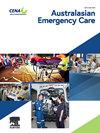Enhancing end-of-life care for advanced heart failure patients in Saudi Arabian emergency departments (EDs): Perspectives of ED staff on challenges
IF 2.1
4区 医学
Q2 EMERGENCY MEDICINE
引用次数: 0
Abstract
Background
Providing care for patients nearing the end of life who have advanced heart failure presents significant challenges, especially in emergency settings where the primary focus is on life-saving interventions. Exploring the perceptions of emergency department staff is essential for identifying barriers and improving care delivery in this critical context.
Methods
A qualitative study was conducted in two hospitals in Saudi Arabia. Semi-structured interviews were completed with thirty emergency staff. A thematic analysis was used to identify the challenges in delivering care for patients nearing the end of life.
Results
Seven themes were identified: current practices for advanced heart failure patients, communication barriers, inadequate training in end-of-life care, limitations in emergency department design, heavy workloads, the influence of cultural and religious factors, and the importance of psychological and emotional support for patients and families. The findings highlight the need for structured training, cultural sensitivity, and improved environments to address these challenges.
Conclusions
This study emphasizes the complexities of providing care for patients nearing the end of life in emergency settings. Addressing gaps in communication, training, and cultural competence is critical. Tailored strategies for Saudi Arabia’s unique context are essential to enhance care for advanced heart failure patients.
加强沙特阿拉伯急诊科(ED)晚期心力衰竭患者的临终关怀:ED工作人员对挑战的看法。
背景:为晚期心力衰竭患者提供护理面临着重大挑战,特别是在紧急情况下,主要重点是挽救生命的干预措施。在这一关键背景下,探索急诊科工作人员的看法对于确定障碍和改善护理服务至关重要。方法:在沙特阿拉伯的两家医院进行定性研究。与30名急救人员完成了半结构化访谈。一项专题分析被用来确定为接近生命终点的病人提供护理的挑战。结果:确定了七个主题:晚期心力衰竭患者的现行做法,沟通障碍,临终关怀培训不足,急诊科设计的局限性,繁重的工作量,文化和宗教因素的影响,以及对患者和家属的心理和情感支持的重要性。研究结果强调,需要有组织的培训、文化敏感性和改善环境来应对这些挑战。结论:本研究强调了在紧急情况下为接近生命末期的患者提供护理的复杂性。解决沟通、培训和文化能力方面的差距至关重要。针对沙特阿拉伯独特国情的量身定制战略对于加强对晚期心力衰竭患者的护理至关重要。
本文章由计算机程序翻译,如有差异,请以英文原文为准。
求助全文
约1分钟内获得全文
求助全文
来源期刊

Australasian Emergency Care
Nursing-Emergency Nursing
CiteScore
3.30
自引率
5.60%
发文量
82
审稿时长
37 days
期刊介绍:
Australasian Emergency Care is an international peer-reviewed journal dedicated to supporting emergency nurses, physicians, paramedics and other professionals in advancing the science and practice of emergency care, wherever it is delivered. As the official journal of the College of Emergency Nursing Australasia (CENA), Australasian Emergency Care is a conduit for clinical, applied, and theoretical research and knowledge that advances the science and practice of emergency care in original, innovative and challenging ways. The journal serves as a leading voice for the emergency care community, reflecting its inter-professional diversity, and the importance of collaboration and shared decision-making to achieve quality patient outcomes. It is strongly focussed on advancing the patient experience and quality of care across the emergency care continuum, spanning the pre-hospital, hospital and post-hospital settings within Australasia and beyond.
 求助内容:
求助内容: 应助结果提醒方式:
应助结果提醒方式:


